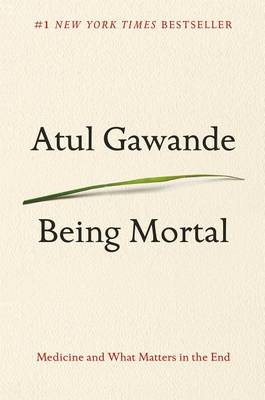Regardless of your number of offspring, I think everyone is nervous about what will happen with age. No one wants to lose their independence. That is the point of this book. The author looks at several programs that aim to let people continue to live a good life as they age and then have a good death.
I was encouraged by reading about all kinds of different ways that people are rethinking elder care. I have a dream of a community of cottages for old introverts where you check in once a day so everyone knows that you are still alive and there is a movie playing every night in case you want a group activity where you don't have to talk to anyone. No one has quite made that yet but there were some that I wouldn't mind.
One of the major concerns in allowing a more independent old age is safety. If you want people to be totally safe, then you can't let them walk around and make (possibly poor) decisions for themselves. Children of elderly people tend to value their safety over their happiness. This leads them to make decisions about care that take away options from the parent.
Has anyone made progress with good deaths? I still think that the way humans approach death is pretty horrific. I'm coming to this discussion from my perspective as a veterinarian. We're all about palliative care until there is a poor quality of life and then euthanasia so there is no suffering. The author discusses increasing access to hospice care earlier in the patient's care to decrease extreme medical interventions that are required of hospitals but don't ultimately aid the patient. That's good but then every story of a "good" death he cites ends with several days of the patient being on all kinds of pain medication so they drift in and out of consciousness. They may not be in pain but what is the point? They are past communication. The families are holding vigils waiting for them to let go. It seems to me that an overdose at this point is so much kinder.
I hear this all the time during euthanasias. People start to talk about their relatives' deaths and how they wish they could have helped them in this way so they didn't have those last few days. I understand slippery slope arguments but it just seems like common sense to me.
The author also discussed different personality types of doctors and how they help and hurt decision making. There are authoritarians who tell the patient what to do without much discussion. There are doctors who give the patient all their options and let them decide what to do. I'm the latter one. We were trained to do this in school. It can confuse clients because they get overwhelmed. They then counter with, "What would you do?" We aren't supposed to answer that question. It isn't a fair one anyway. We aren't in the same situation. I could do things at home that you might not be able to. I might tolerate inconveniences more or less than you do. The author talks about how he learned to give more opinions about how different choices might affect their lives. I've started to do this too some. I think it has helped some people.
He also recommends having end of life discussions with your family members before decisions need to be made. Then if you are in an emergency situation where you can't talk to them about it, you know what to do.
What would be your ideal way to live out your last few years?
This review was originally posted on Based On A True Story
